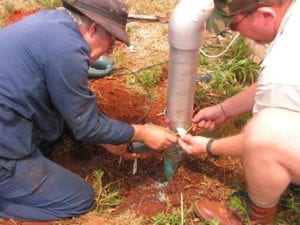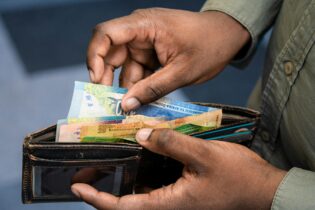Measuring and metering of irrigation water will not only improve regulation of agricultural water use in South Africa, but it will also boost farmers’ profits. This is according to the Water Research Commission (WRC), which has invested in irrigation watermetering research for more than a decade.
While irrigation water measuring is still not widespread in South Africa, emerging trends suggest that water meters are becoming increasingly important tools to aid farmers. “There is an increasing realisation that it makes absolute business sense to accurately and reliably measure water use in order to reduce cost and thereby increase profitability,” notes WRC executive manager: Water Utilisation in Agriculture, Dr Gerhard Backeberg. The financial returns to an irrigator are strongly correlated with the volume and pattern of irrigation water application (not only through the cost of water but also that of electricity). Moreover, there are a number of new technologies that offer better information and decisionsupport to irrigators, making water use management more convenient and accurate. In addition to the benefits to farmers, the implementation of irrigation water measurement has been encouraged through the National Water Act and the National Water Resource Strategy (the first as well as the second version, the latter published earlier this year). The Department of Water Affairs (DWA) has also announced its intention to publish new regulations for water measurement, which could see more strict enforcement of water metering. In anticipation of this trend, the WRC has funded research in the area of irrigation water measuring and metering for over a decade. The knowledge generated through this process has clearly demonstrated the application and benefits of water metering and measuring in irrigated agriculture. “The whole purpose of the investment in research and technology transfer in this area by the WRC has been to show that water metering technology is available, and to provide guidelines for managed implementation of irrigation water measuring,” explains Backeberg. “With correct incentives of volumetric water use charges to recover operation and maintenance cost for water supply, there is no doubt that irrigation water use measuring will expand in future. While the enforcement of regulations for water measurement will ensure compliance, this should be seen as a last resort. Preferable is the realisation that irrigation water measurement is good business practice.”Efforts have been made to involve farmers and/or managers of water user associations and irrigation boards in all the research and technology transfer projects of the WRC. “This has certainly raised awareness and gradually changed the attitude [of the farming sector] towards measuring or metering of irrigation water use, certainly for those individuals and organisations involved in these projects,” notes Backeberg.
The commission’s latest water metering-related project, which was co-funded by the Department of Agriculture, Forestry & Fisheries, facilitated a process towards effective implementation of water measurement at river, irrigation scheme and farm level in South Africa. In order to achieve this, end users of water-measurement technology were made aware and convinced to adopt the technologies. The report is titled Guidance for sustainable on-farm and on-scheme irrigation water measurement. Specific attention was given to technical requirementsand financial justification for implementation of the technologies for water measurement. Purposeful capacity building and training of endusers formed an important aspect of this work. Different target groups were involved in the project, from individual farmers and water managers on schemes to manufacturers of metering equipment and government officials, among others. The final output of this technology transfer project is a final report that documents the implementation process, the lessons learnt and guidelines towards general implementation of irrigation water measurement. As with all efforts to encourage uptake of research-based knowledge, in particular with reference to technologies and management practices for water measuring and metering, the most important requirement is to appreciate the complexities of the adoption process. This project again highlighted the need to use different communication channels to disseminate available knowledge, allow progression of time from awareness to persuasion to implementation and ongoing adaptation. It also recognises the role of demonstration for observing and evaluating the benefits of irrigation water measuring. The WRC will now be finding partners to exploit and disseminate the available knowledge (including correctly managed implementation) and technologies on irrigation water measuring and metering. For this purpose, a short-term research project will be initiated later this year with a team comprising representatives of roleplayers, such as the South African Irrigation Institute, Agricultural Research Council, Agri SA and the South African Association of Water User Associations. “The challenge now is to exploit the commercial benefits on farms and irrigation schemes, which will be to the economic advantage ofthe water sector as a whole,” Backeberg points out. “International evidence shows that the lead time for research-based knowledge to become applicable and accepted in the market takes 25 to 35 years. Perseverance and a continuous drive to support exploitation of available knowledge to implement water metering and measuring over the next 10 to 20 years are therefore essential.”






